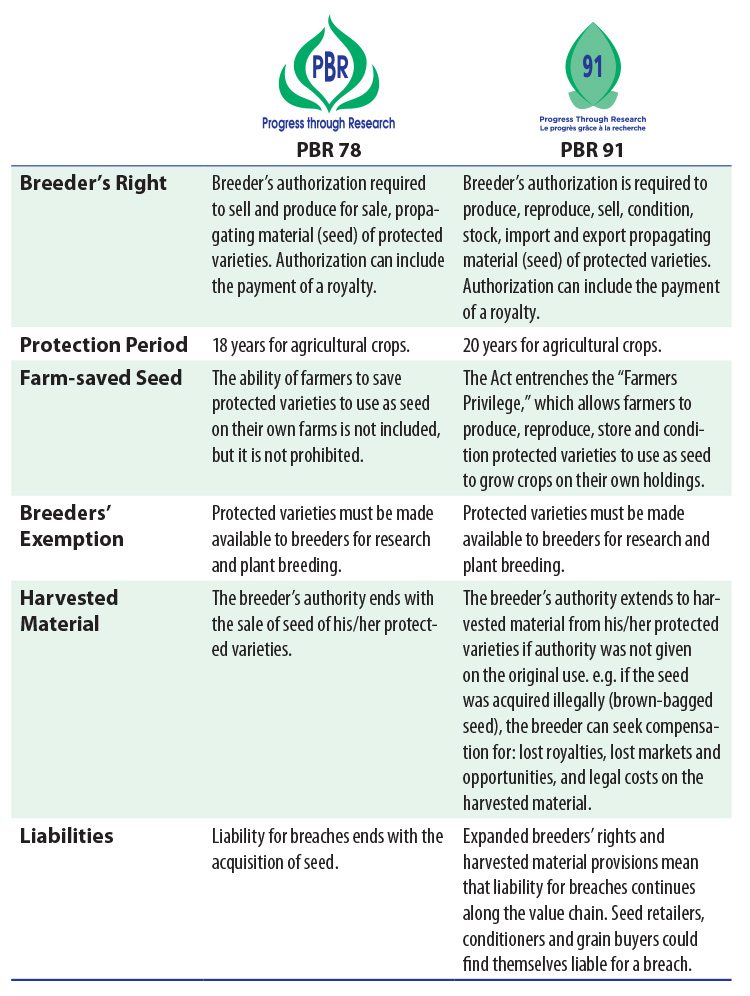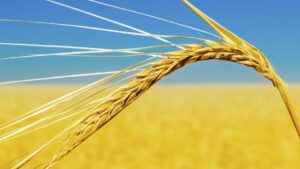It has been almost one year since Bill C-18, the Agricultural Growth Act, was implemented by the Government of Canada. Among the key components of the Act were changes to Canada’s Plant Breeders’ Rights (PBR) Act. The changes brought Canada’s PBR in line with the rest of the world, opening Canada for investment in plant breeding and research and giving Canadian farmers more access to improved varieties developed internationally._x000D_
_x000D_
According to David Hansen, president and CEO of Canterra Seeds, Feb. 27, 2015 was a historic day with the passing of Bill C-18 for Canadian farmers and for the seed sector in Canada. He said in a Canterra news release: “We are going to see more innovation and investment, improved seed genetics and a broader selection of varieties available for producers as a result of the changes that have been made.”_x000D_
_x000D_
It appears that Hansen’s forecast is coming true. A news release from the Canadian Seed Trade Association (CSTA) in April 2015 highlighted that within two months of the implementation of Bill C-18, three new wheat varieties, all developed in the United States, and six internationally developed potato varieties were given PBR protection under the new Act._x000D_
_x000D_
UPOV 91 In Action_x000D_
_x000D_
According to PBR commissioner Anthony Parker with the Canadian Food Inspection Agency, the trend is continuing. “Before PBR amendments were introduced in Parliament, the PBR office received approximately 80 applications for agricultural crops annually. As the amendments moved through Parliament the number of applications almost doubled, reaching 148 for fiscal year ending March 2015._x000D_
_x000D_
“In the nine months since Bill C-18 came into force the office has received 90 additional applications,” says Parker. He says the diversity of crops has also increased. “We are now seeing applications for beans, peas, lentils, faba beans, chickpeas, canarygrass, mustard and hemp in addition to the traditional wheat, soybeans, canola and potato applications.”_x000D_
_x000D_
The new PBR Act (PBR 91) complies with the most recent convention of the Union for the Protection of New Plant Varieties (UPOV). All varieties protected by PBR after Feb. 27 are under PBR 91. However all varieties protected by PBR before February 27 continue to be protected under the old Act, (PBR 78). “For some time, seed retailers will be selling seed of varieties protected by two different Acts,” says Parker. “It is very important that they know whether and how the varieties they are selling are protected, and that they understand and communicate the different responsibilities that come with different protection.”_x000D_
_x000D_
To help the value chain identify varieties and differentiate them by the type of PBR protection, the CSTA has developed certification marks that are used in seed guides and advertising, on seed bags and field signs, and in educational material._x000D_
_x000D_
_x000D_
This logo has been used by seed companies for many years to identify varieties protected by PBR. It will continue to be used to identify varieties protected under the old Act PBR 78_x000D_
_x000D_
A new logo has been developed to identify varieties protected under the new PBR Act PBR 91._x000D_
_x000D_
_x000D_
The major differences between PBR 78 and PBR 91 are explained in the table below._x000D_
_x000D_
Be in the Know_x000D_
_x000D_
However, logos are just logos. According to Rod Merryweather, president and CEO of FP Genetics, education and understanding have to go with the logos, He adds that retailers, as the front line of the seed business, have an important educational role so they need to be prepared._x000D_
_x000D_
“The main difficulty is that when prosecuting an infraction, the offender may argue that the regime is very confusing and he/she didn’t know they were infringing the PBR Act,” says Merryweather. “FP Genetics believes that most commercial farmers will not knowingly break the law, so the education component is paramount. Retailers need to be trained to inform their customers about their rights and responsibilities under PBR 91 compared with PBR 78.”_x000D_
_x000D_

_x000D_
In addition to training retailers in meetings, with newsletters, and the provision of educational material, FP is making use of another tool to help customers comply. Merryweather says: “Commencing early 2015, all new FP Genetics varieties that are sold as certified seed must have the buyer complete a ‘Customer Commitment Form’. The form specifies that the buyer agrees to re-use as seed only on his own land. This is to ensure that the buyer is aware of the responsibilities associated with the seed. It is a form of contract and is also a communication tool to the primary grower. For the most part, the grower/retailers have had these forms completed prior to releasing the seed.”_x000D_
_x000D_
Canterra Seeds is using a similar agreement with buyers of its protected varieties. “Canterra’s ‘Pedigreed Seed Purchase Commitment form’ helps to focus customers on the new environment, and gives the seed distribution system the opportunity to explain the benefits of enhanced PBR and the value that increased investment will bring to the whole value chain,” says David Hansen. “Throughout this whole process we have been learning [as well as] dealing with misconceptions and rumours and fears, and now we are working with the value chain to help them learn with us.”_x000D_
_x000D_
While not currently using a commitment form at this time, SeCan Corporation is going all out with education efforts. From poster boards, postcards and fact sheets, to ads on porta-potties at trade shows, SeCan is very ‘in-your-face’ with its outreach._x000D_
_x000D_
“There is no backing off,” says Todd Hyra, SeCan’s western business manager. “We didn’t do a very good job 20 years ago when Canada implemented PBR the first time. It’s no fun to be involved in an enforcement action facing claims from infringers that they didn’t know. This new Act gives us an opportunity to ensure that they do know.”_x000D_
_x000D_
Hyra says that seed retailers have a big role to play in the effort to prevent PBR infringements, but he says it isn’t always an easy position to be in. “As members of the community they are faced with the dilemma of reporting an infringer that is another member of their community. In some cases this could be a neighbour, or a customer that purchases large quantities of other products or services.”_x000D_
_x000D_
However, the expanded breeders’ rights and the harvested material provisions of PBR 91 shift the responsibility throughout the value chain “No longer is the seller alone liable for breaches. Purchasers also have the responsibility to ensure that transactions are compliant with PBR,” Hyra says. “Rather than appearing to be self-serving, retailers now have the opportunity to help their customers along the value chain to protect themselves from PBR infringements.”_x000D_
_x000D_
Protecting Your Operation_x000D_
_x000D_
In addition to being a primary source of information and education for farmers and others along the value chain, Lorne Hadley, executive director of the Canadian Plant Technology Agency (CPTA), says retailers need to be completely confident that they are not themselves infringing PBR when they sell seed. “It has never been legal to sell farm-saved seed of varieties protected by Plant Breeders’ Rights. If retailers have been ‘brown bagging’ seed, they are essentially selling stolen property.”_x000D_
_x000D_
Seed sellers need to have a good understanding of what constitutes a sale. Hadley says sale isn’t just an exchange of money. “Including seed as part of a custom planting service or exchanging seed for another product or service like cleaning or transportation are considered to be a sale under PBR,” he says. “If the seed is of a PBR protected variety, and the breeder has not given the authority to do these things, the seed seller or service provider may also be liable for damages from a PBR infringement.”_x000D_
_x000D_
Hadley says that grower/retailers who clean seed or apply seed enhancements also need to ensure that they are processing legally acquired seed, or they can be liable for a PBR infringement. He says most seed conditioners are developing language for work orders that include assurance that the seed was acquired legally and, if it is farm-saved, was produced and will only be planted on the farmer’s own holdings._x000D_
_x000D_
Some grain buyers (elevators, feed processing plants, millers, etc.) are also developing declarations to be signed by farmers from whom they buy grain. Farmers will need to declare that the grain was produced from legally acquired seed -— either certified seed, or farm-saved seed produced on their own farms._x000D_
_x000D_
“The potential liability for PBR infringements will be all along the value chain,” Hadley says. In addition to investigating possible infringements, CPTA is focussing on coaching for compliance. “Everyone along the value chain is affected and they all need to understand how to comply with the new law,” says Hadley._x000D_
_x000D_
Industry optimism in the new PBR environment is palpable. Plant breeders, both Canadian and international, are excited about the future for Canadian agriculture. However, future success will only be realized if everyone along the value chain works together to create and maintain an environment that encourages investment._x000D_
_x000D_
According to SeCan’s Todd Hyra, retailers have a big role to play. “Retailers are expected to be one of the local experts with regard to issues related to seed. It is critical that they not only understand the agronomic and quality considerations for a seed product but the legal obligations that accompany it,” he says. “If retailers are not prepared they risk liability for PBR infringements by themselves and/or their customers and, in the long term, they deny farmers access to the best possible genetics developed in Canada and internationally.”














